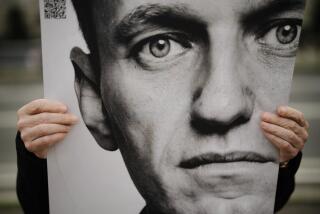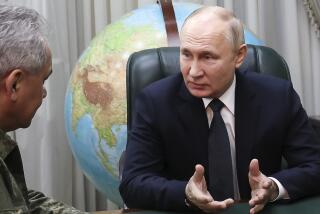2 Kremlin Officials Visit Chernobyl Area, Issue Orders
- Share via
MOSCOW — Two top Kremlin officials visited the area of the Chernobyl nuclear disaster Saturday and ordered unspecified additional measures to speed repairs to the stricken power station and help people who were evacuated from the region, the Tass news agency reported.
Premier Nikolai I. Ryzhkov and Yegor K. Ligachev, a Politburo member regarded as the second-ranking official in the Kremlin behind Soviet leader Mikhail S. Gorbachev, led a delegation to the area, Tass said.
The official news agency did not say how close the delegation traveled to the damaged nuclear installation. But the agency reported that the two men talked with some of the thousands of people who were evacuated from the area of the Chernobyl plant, where by official Kremlin account, an explosion about a week ago killed two people, injured 197 others and released clouds of radioactive pollution into the atmosphere.
Ryzhkov and Ligachev discussed the problem of providing jobs for the evacuees, Tass said, indicating that the evacuees would not return to their homes for some time to come.
“It was pointed out that the work to eliminate the breakdown and its consequences is being conducted in an organized way, with the use of the necessary means,” Tass said. “Decisions were taken on additional measures to expedite the work.”
As in the past, however, the Tass report gave no indication of the dimensions of the disaster nor of the precise level of radiation remaining in the wake of the massive leak of radioactive particles.
The report Saturday by Tass and television film of bright, sunny street scenes from Kiev, a city of 2.4 million 60 miles south of Chernobyl, appeared designed to reassure Soviet citizens that things are returning to normal after the nuclear accident, which, according to Western experts, included a fire and the meltdown of the fuel core of at least one of Chernobyl’s four graphite-moderated reactors.
‘Dirty Political Aims’
In a separate commentary, the official news agency accused the United States of embellishing the episode for “dirty political aims” of discrediting the Soviet Union.
It accused the United States and Britain of dramatizing the withdrawal of students and tourists from Kiev last week. The Moscow embassies of both countries said that they advised their citizens to leave Kiev because the Soviet government refused to provide any solid information on the extent and level of radiation in Kiev, the principal city in the Ukraine.
“The White House and its assistants needed this bedlam to cast a shadow on the Soviet Union and its peaceful initiatives and to put in doubt the very possibility of holding talks and reaching agreements with the Soviet Union,” Tass said.
In street interviews shown on Vremya, the main evening television news program shown nationally, three Muscovites made the same complaint, charging that Western politicians were like ghouls, looking for bad news or exaggerating the impact of the tragedy.
Western experts outside the Soviet Union have said the accident is the worst in the 32-year history of nuclear energy plants.
Ryzhkov and Ligachev were accompanied by Boris Y. Shcherbina, a deputy premier and chairman of the government commission assigned to investigate the Chernobyl disaster; Vladimir V. Shcherbitsky, Politburo member from the Ukraine, and other Ukrainian government and party leaders.
The group, including some representatives of the Chernobyl power station itself, discussed steps already taken to eliminate the cause of the reactor breakdown, to normalize the situation in the surrounding area and to give aid to local people, Tass said.
Ryzhkov and Ligachev, who were both elevated to full membership in the Politburo without spending the usual time as non-voting members, are regarded as the closest associates of Gorbachev in the Soviet governing body.
Meantime, the Swedish Embassy held a meeting with about 50 Swedish citizens in Moscow, including the diplomatic staff.
Swedish officials said that they felt it was safe to remain in Moscow but passed along the advice of the Swedish Radiological Institute to stay at least 60 miles and preferably 300 miles away from Chernobyl.
They offered government-paid transportation for those who felt anxious about staying in the Soviet capital but stressed that no evacuation was contemplated.
In a related development, four American specialists in nuclear monitoring arrived with special equipment to check on radioactivity among U.S. citizens in Moscow.
More to Read
Sign up for Essential California
The most important California stories and recommendations in your inbox every morning.
You may occasionally receive promotional content from the Los Angeles Times.










